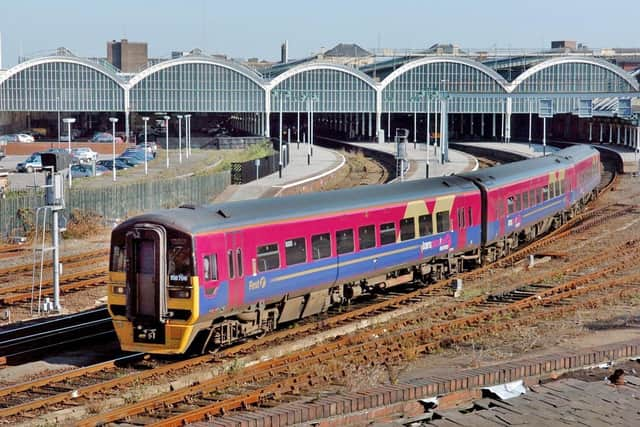Stalled plan to electrify Hull to Selby line 'depressing case study in Government failure'
The plan was initially backed by Government in 2015 when £94m of private investment was available to support it but has subsequently been shelved.
The proposal was originally put forward by First Hull Trains in 2013, when it proposed borrowing the cash from finance firms to fund the work.
Advertisement
Hide AdAdvertisement
Hide AdIt was hoped at the time that the work would be complete in time for Hull hosting the UK City of Culture in 2017.


A new report written by transport analyst Tony Lodge for the Centre for Policy Studies centre-right think-tank highlighted the situation as an example of why the Government needs to press ahead with further private sector investment in the railways.
Mr Lodge said: “One of the major successes of the privatised era was the ability to bring in private investment to improve the railway.
“Thousands of new trains, financed privately, have been built, enabling the removal of slam door trains in the South and outdated Pacer trains in the North.
Advertisement
Hide AdAdvertisement
Hide Ad“Such changes have allowed for major strides forward in accessibility, passenger comfort and satisfaction.
“However, private investors are keen to go further and invest in rail infrastructure. A promising new initiative was launched by the Government in 2018 to capture this appetite, called ‘market- led proposals’.
“This recognised that Government did not have a monopoly on good ideas, and invited private parties to bring forward proposals for investment in rail infrastructure. Unfortunately, this initiative has stalled.
“Government has proven slow to engage and still has not set out any timescale or process to progress the initiative.”
Advertisement
Hide AdAdvertisement
Hide AdMr Lodge added: “A depressing case study of the DfT’s failure to both encourage and embrace private sector infrastructure rail funding is the on-off plan to electrify the 70 miles between Selby and Hull in Yorkshire.
“The Government backed the plan in 2015, then dropped it in 2016 – even though it involved £94m of privately funded investment. The project was then revived, but then failed to make it on to the shortlist of approved schemes.”
The Government's Integrated Rail Plan published in November did not include any new schemes serving Hull but did state that any future development of rail routes to the city should focus on electrification.
Mr Lodge said an “obvious first step” for the Government’s new Great British Railways body should be reviving the market-led proposals scheme.
Advertisement
Hide AdAdvertisement
Hide Ad“Rail needs to get back to a mixed economy of investment, with Government money focused on policy-based mega-projects and levelling up schemes, while encouraging the private sector to invest in financially viable infrastructure and new station schemes in the South,” he added.
“This is particularly important given the financial constraints the Government is under – and the environmental impact of such schemes.”
Treasury hesitation over electrification schemes
The Government is understandably hesitant to fund rail electrification schemes with taxpayer cash, the report said.
Mr Lodge said: “The Treasury is reluctant to fund it - especially given the massive amounts it is already having to put into propping the rail network up after the pandemic.
Advertisement
Hide AdAdvertisement
Hide Ad“We share this concern. The taxpayer cannot be simply asked to cover all lost revenue post-Covid.
But he added: “The European Environment Agency suggests that rail travel creates 14 grams of CO2 emissions per passenger mile, compared with 158 grams by car and 285 grams by plane.
“The implication of the emissions statistics is that any form of rail is better for the planet than road transport.”
At The Yorkshire Post, we are committed to speaking truth to power on behalf of the people who call God’s Own County their home. Our political team and Westminster Correspondent are Yorkshire's eyes and ears in the corridors of power.
If you’d like all the latest political news straight to your inbox, you can sign up to our newsletter for free at: https://www.yorkshirepost.co.uk/newsletter
